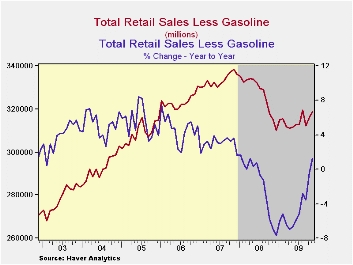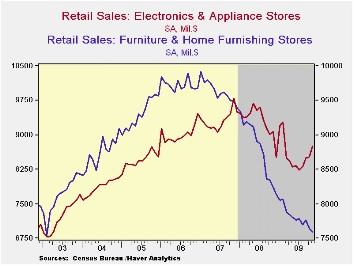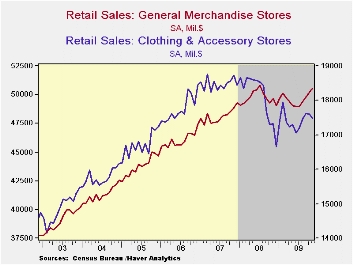 Global| Dec 11 2009
Global| Dec 11 2009U.S. Retail Sales Revive As Discretionary Spending Improves
by:Tom Moeller
|in:Economy in Brief
Summary
The consumer looks to be gaining strength after earlier torpor. Retail sales last month rose 1.3% after a downwardly revised 1.1% increase during October. The latest increase was stronger than the 0.7% Consensus expectation and it [...]
 The consumer
looks to be gaining strength after earlier torpor. Retail sales last
month rose 1.3% after a downwardly revised 1.1% increase during
October. The latest increase was stronger than the 0.7% Consensus
expectation and it moved the y/y change in sales into positive
territory for the first time since August of last year. Moreover,
spending on "core" retail sales has improved. Month-to-month changes in
overall sales in recent months have been quite volatile due to auto
sales promotions and rising gasoline prices. Aside from these
distortions, gains in consumer spending have been steady during the
past several months. The retail sales data are available in Haver's USECON
database.
The consumer
looks to be gaining strength after earlier torpor. Retail sales last
month rose 1.3% after a downwardly revised 1.1% increase during
October. The latest increase was stronger than the 0.7% Consensus
expectation and it moved the y/y change in sales into positive
territory for the first time since August of last year. Moreover,
spending on "core" retail sales has improved. Month-to-month changes in
overall sales in recent months have been quite volatile due to auto
sales promotions and rising gasoline prices. Aside from these
distortions, gains in consumer spending have been steady during the
past several months. The retail sales data are available in Haver's USECON
database.
 Auto sales recently firmed after earlier weakness. Last
month, motor vehicle sales rose 1.6% after the 7.1% jump during
October. Though the y/y change improved further into positive
territory, sales were still 23% below the 2007 high. Less autos, sales
jumped 1.2% aided by higher gasoline prices. That increase compares to
an expected 0.4% increase. Higher gasoline prices lifted November fuel
expenditures by 6.0% m/m and by more than one-quarter since December.
Nevertheless, without autos & gasoline retail sales still rose
by 0.6% last month, the third firm gain in the last four
months. These gains raised the y/y change to 0.4% from -4.5%
as of July.
Auto sales recently firmed after earlier weakness. Last
month, motor vehicle sales rose 1.6% after the 7.1% jump during
October. Though the y/y change improved further into positive
territory, sales were still 23% below the 2007 high. Less autos, sales
jumped 1.2% aided by higher gasoline prices. That increase compares to
an expected 0.4% increase. Higher gasoline prices lifted November fuel
expenditures by 6.0% m/m and by more than one-quarter since December.
Nevertheless, without autos & gasoline retail sales still rose
by 0.6% last month, the third firm gain in the last four
months. These gains raised the y/y change to 0.4% from -4.5%
as of July.
 Improvement in discretionary "core" spending was evident
in the latest data. Sales at general merchandise stores rose 0.8% (1.8%
y/y) during November and roughly matched the firm gains during the
prior three months. The worst of spending in this area was reached
during July when sales were down 3.6% y/y. Sales of electronics also
increased 2.8% (-3.4% y/y) last month following three months of firm
increase. Elsewhere last month, discretionary retail sales were weak.
Furniture store sales fell 0.7% (-7.9% y/y) and have fallen steadily
since early 2007. In soft goods, apparel store sales fell 0.7% after a
revised 0.2% October downtick that previously was reported as an
increase. Nevertheless, the y/y change improved to 0.9% from the 9.7%
decline at the end of last year.
Improvement in discretionary "core" spending was evident
in the latest data. Sales at general merchandise stores rose 0.8% (1.8%
y/y) during November and roughly matched the firm gains during the
prior three months. The worst of spending in this area was reached
during July when sales were down 3.6% y/y. Sales of electronics also
increased 2.8% (-3.4% y/y) last month following three months of firm
increase. Elsewhere last month, discretionary retail sales were weak.
Furniture store sales fell 0.7% (-7.9% y/y) and have fallen steadily
since early 2007. In soft goods, apparel store sales fell 0.7% after a
revised 0.2% October downtick that previously was reported as an
increase. Nevertheless, the y/y change improved to 0.9% from the 9.7%
decline at the end of last year.
Internet and catalogue purchases were quite firm last month. The 1.2% (8.1% y/y) increase was the fifth strong monthly increase in the last six and the y/y gain contrasted with a 7.6% decline as of April. Restaurant sales rose 0.5% (-0.2% y/y) after falling slightly during the prior five months. Finally, building materials sales reversed the prior months decline and rose 1.5% (-9.3% y/y).
Employment Projections: 2008-2018 from the Bureau of Labor Statistics can be found here
| November | October | September | Y/Y | 2008 | 2007 | 2006 | |
|---|---|---|---|---|---|---|---|
| Total Retail Sales & Food Services (%) | 1.3 | 1.1 | -2.0 | 1.9 | -0.8 | 3.3 | 5.3 |
| Excluding Autos | 1.2 | 0.0 | 0.7 | 1.3 | 2.5 | 3.9 | 6.3 |
| Non-Auto Less Gasoline | 0.6 | 0.1 | 0.6 | 0.4 | 1.6 | 3.6 | 5.7 |
Tom Moeller
AuthorMore in Author Profile »Prior to joining Haver Analytics in 2000, Mr. Moeller worked as the Economist at Chancellor Capital Management from 1985 to 1999. There, he developed comprehensive economic forecasts and interpreted economic data for equity and fixed income portfolio managers. Also at Chancellor, Mr. Moeller worked as an equity analyst and was responsible for researching and rating companies in the economically sensitive automobile and housing industries for investment in Chancellor’s equity portfolio. Prior to joining Chancellor, Mr. Moeller was an Economist at Citibank from 1979 to 1984. He also analyzed pricing behavior in the metals industry for the Council on Wage and Price Stability in Washington, D.C. In 1999, Mr. Moeller received the award for most accurate forecast from the Forecasters' Club of New York. From 1990 to 1992 he was President of the New York Association for Business Economists. Mr. Moeller earned an M.B.A. in Finance from Fordham University, where he graduated in 1987. He holds a Bachelor of Arts in Economics from George Washington University.






